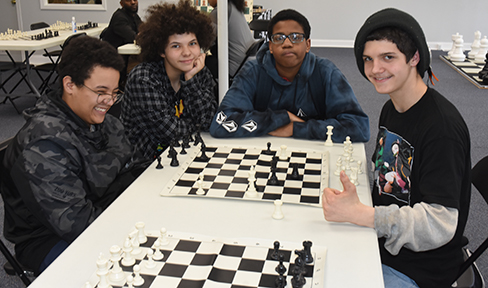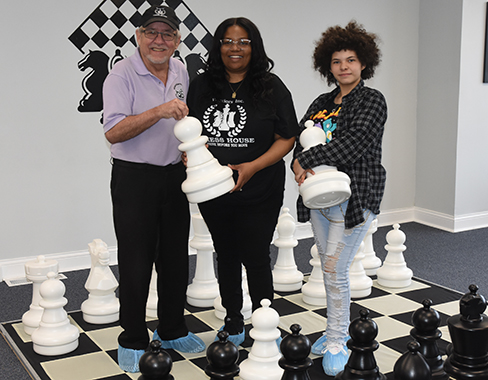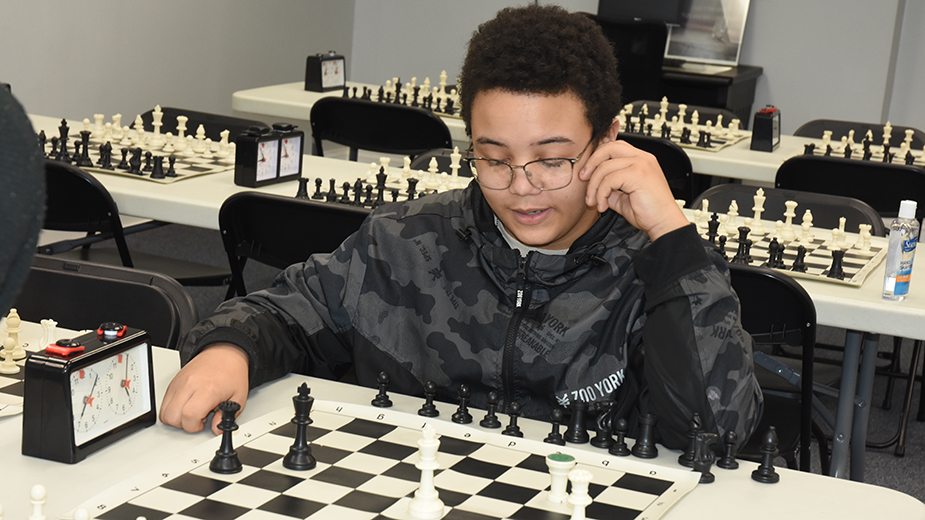YOUNGSTOWN, Ohio – Sebastian Parnaby, a 15-year-old student at the Academy of Urban Scholars in Youngstown, gazes at a chessboard and contemplates his next move against his opponent, fellow student Jacob Evans.
At least once a week, Parnaby makes it a point after school to dash into the Chess House at 3431 Market St., next door to the academy. Inside the smartly renovated building is an array of tables holding three chessboards each, all prepped and ready for play. A central feature inside is a large floor chessboard with oversize black and white chess pieces.
At the Chess House, Parnaby says he’s able to concentrate on building skills that aren’t easily taught in the classroom: patience, focus and the ability to experience firsthand how decisions have consequences.
Oh, and another reason Parnaby shows up to play: He’s very good.
“I didn’t start playing until last year,” Parnaby says. “I watched a video on how to play chess. I absorbed it, and within a couple of weeks, I was able to grasp it.”

Parnaby says chess relieves much of the stress that he struggles with daily. “I have bad anxiety, so when I play chess, I calm down. It redirects my thoughts and allows me to focus.”
Even more impressive is in the five months since he first sat behind a chessboard, Parnaby is now able to defeat his chess coaches.
“He’s one of the ones that I’m most proud of,” says Michael Taninecz, who manages the daily operations of the Chess House. “He walked in here in November and picked it up just like that.”
The Chess House, established in 2019, serves as a gathering place where chess lovers of all ages congregate, compete or play for fun and test their skills against one another. No membership or fees are required, just a desire to engage in a game that has for centuries challenged some of the world’s brightest minds.
In a sense, chess boils down to a game of military strategy. The game’s earliest references date to the seventh century in India, while the modern version and current rules were finessed in Western Europe sometime between the 10th and 15th centuries.
The objective is to enlist an army of chess pieces – two rooks, two knights, two bishops, eight pawns and a king and queen – and navigate the 64 black and white squares on the chessboard to effectively trap, or checkmate, your opponent’s king. Simultaneously, players must also use these pieces to protect and defend their king from an opponent’s attack.
But there’s much more to chess than competition, says Joe McGeorge, executive director of Warriors Inc., a nonprofit, faith-based organization that provides education, community development and mentorship programs for inner-city youth.
The Chess House is operated and owned by Warriors Inc. On a Wednesday afternoon in early April, five students from the Urban Scholars academy trickled in after classes to sit for a few games.
“It was a vision of mine because I know how important chess was in my life,” McGeorge says. “It helped me with critical thinking, and I wanted to bring something back here that helped me.”
Several years ago, McGeorge came up with the idea to establish The Chess House as a community and cultural center where patrons can enjoy a game or listen to various local poets read their works. He was inspired by the story of Eugene Brown, who learned the game while incarcerated. When he was released, Brown founded the Big Chair Chess Club to influence young people in inner-city Washington, D.C. His goal was to turn their attention away from the streets and to develop a sense of self-respect and accomplishment through chess.
“Chess parallels the game of life,” McGeorge says. “There’s a consequence and reward for every move you make in chess. The same with life.”
That’s the message McGeorge drives home when he teaches the game to young people. “When I teach chess, I make it about life.”
McGeorge relates that his love of the game started at age 9, when he received a chess set for Christmas. “I became intrigued with the game and started playing and playing and playing,” he recalls. “It helped me to think critically, to concentrate. These are things that a lot of kids don’t do today.”
The Chess House provides the perfect antidote for young people who today are inundated with video games and technology at the touch of a button, McGeorge says. But the Chess House isn’t confined to students, as folks of all ages are welcome. In March, the venue hosted its first “Jazz and Chess” event, which featured a local jazz band in the back room as chess players took to the tables. Warrior Inc.’s “Poetry Slams” are held every second Thursday of the month.
“The best thing you can do is to do the things that inspire you,” McGeorge says. “We’re trying to bring back a lost art.”

The Chess House’s Taninecz says several of the young people who recently started to play have developed into seasoned players. “They’re experienced players already – some of the older guys like to teach them as well,” he says.
Ironically, Taninecz doesn’t consider himself an especially talented chess player.
“I played in high school but didn’t play for another 50 years. I try to help the kids as much as I can,” he says. Taninecz can teach some of the basics but relies mostly on playing videos or introducing students to books when it comes to instruction.
Taninecz – a retiree who worked for 40 years at Republic Steel – considers chess good therapy to improve cognitive skills. “It’s really helped my mind,” he says. “When you get older, you get a little forgetful.”
The Chess House was forced to close when the COVID-19 pandemic struck. Since it reopened, the center has gained traction and is drawing more interest, says Jessica Rosario, community and family liaison for Warriors Inc.
“We are just one of three chess houses in the United States,” she says.
Students from across Mahoning County come to the Chess House, although most are from the inner city, Rosario says.
Organizations such as Inspiring Minds, an afterschool mentorship and development organization, have introduced students to the venue, as have area schools such as Chaney High School through its newly established chess club.
Rosario says the youngest player is 5 years old, while some of the older players are in their 70s.
“It’s become very big, especially in the urban community,” Rosario says.
The open room is replete with inspirational messages as decor. “Initiative: If You Don’t Take a Chance, You Don’t Stand a Chance,” reads one framed poster on the far wall. “When You See a Good Move, Look for a Better One,” reads another.
“Every move you make, there’s a react,” Rosario says. “It helps kids to be creative, to get them away from electronic games.”
Rosario relates that everyone in her family plays chess. During a recent power outage, the family huddled around a chessboard under candlelight for a game to pass the time. “You don’t need much. You can find a chessboard – a small one – for about five dollars,” she says.
Keith Logan, a teacher at Urban Scholars, says he’s surprised that students have expressed so much interest in tabletop games such as chess.
“They like the physical component of it,” he says. Many also have taken to digital versions of the game.
Eddie Qioto-Martinez, a 15-year-old student at Urban Scholars, says he learned the game on New Year’s Eve 2021. “My uncle taught me,” he says. “It’s very fun. Anything can happen.”
More experienced players are often on hand to help beginners or other familiar competitors.
“My objective in this game is to attack, while at the same time protect,” says Matt Alpeza, who has played for 25 years. “I’m here three times a week and come to play before work,” he says. “I try to play as much as I can.”
Chess teaches strategy, Alpeza says. While you need to be cognizant of your moves on offense, you also need to be aware of how your opponent will respond. As such, an experienced player is always thinking three or four moves ahead. “That’s how you become really good at the game.”
Moreover, The Chess House encourages young people to develop thinking skills to prepare them for adulthood and the choices they may face in the future, Rosario says.
“These kids pick up a great skill and learn to interact with people,” she says.
Or as Qioto-Martinez puts it: “Chess is strategy. Life is strategy, you know?”
Pictured at top: Sebastian Parnaby plays chess at least once a week at The Chess House on Market Street.
The Chess House, 3431 Market St., is open Tuesday, Wednesday and Thursday from 2 to 7 p.m., and Saturday from 10 a.m. to 3 p.m.
